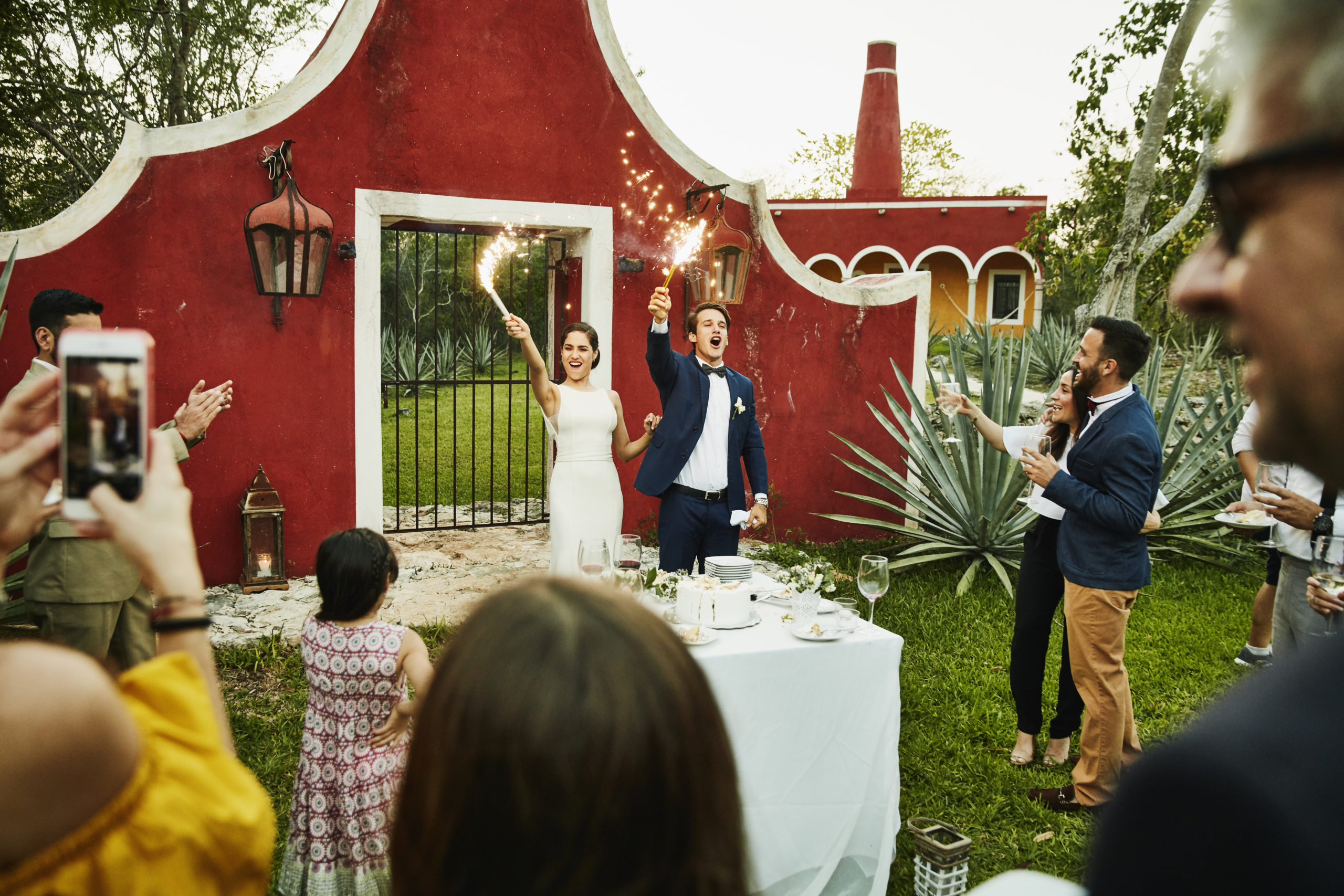It’s easy to ring up a slew of wedding expenses as you try to make your big day perfect. But a little planning can help you avoid common money traps, stay on budget, and fully enjoy your special day.
Of course, everyone is different, and one couple’s wedding mistake might be another’s treasured memory. But if you’re trying to keep wedding costs in check, watch for money missteps that can break your wedding budget or serve up more stress than savings.
Here are common wedding mistakes that can cost you big, plus smart ways to save so you can fully enjoy your big day.
Wedding Planning Mistake No. 1: Not Having a Wedding Budget
You might be tempted to avoid setting a budget because you worry you won’t be able to have your wedding cake and eat it, too. But it’s totally doable to get married on a budget as long as you’re willing to negotiate and be flexible.
It’s also a good idea to find out how much wedding products and services cost before you crunch numbers. Many couples underestimate wedding costs by 45% during their initial planning, according to WeddingWire’s 2019 Newlywed Report survey of over 18,000 U.S. newlyweds, which found the average ceremony and reception cost more than $29,000.
Do this instead: Look at your savings accounts, ask your families if they plan to contribute, and set an initial wedding budget. The WeddingWire survey found that couples pay 45% of their wedding expenses, on average, with family picking up most of the rest of the tab.
“Approach budgeting for a wedding the same way you would for a car or new home,” says Trish Simitakos, a Washington, D.C.-based wedding planner.
Do some initial research on local venues and services to see if your budget and expectations match. If not, you may need to increase your amount or scale back your wedding plans.
Set a “hard budget” so your costs don’t edge up, and as a rough guideline, expect to spend 50% of your budget on food and drinks, Simitakos says.
Wedding Planning Mistake No. 2: Assuming DIY Is Cheaper
You might think doing your own wedding planning will save you money, but that’s not always the case. The average couple pays $1,850 for professional wedding planning, according to the WeddingWire survey, but an experienced wedding planner might be well worth it.
A planner may be able to get you deals, spot scenarios where you’re being overcharged, and alert you to any items you’re missing that could cost you more later, Simitakos says. When you factor in savings, you may break even on the fee while gaining more time to enjoy the wedding planning process and your big day.

Going DIY also can backfire on everything from décor to flowers to favors to cute little details. San Francisco-based wedding planner Sarah Carroll often sees couples stress out over wedding DIY projects, so she recommends finding out how much it would cost to have the item or service done for you.
“It’s not always a money saver,” she says of going DIY. “If it’s the same price, and you’re not someone who particularly enjoys being crafty, skip it.”
Do this instead: Comparison-shop for wedding planning services and consider partial wedding planning if you want logistical help for less, says Carroll, who offers four levels of service at different prices. For example, you could use a planner to create a schedule, and hire and manage three main vendors at a lower rate than you’d pay for full-service planning, she says.
Even if you go DIY on the planning, consider hiring a day-of coordinator rather than relying on a friend or family member to put out last-minute fires, she suggests. The average cost of a day-of wedding coordinator starts at about $800, according to WeddingWire’s Wedding Planner Cost Guide.
“That’s where things fall through the cracks,” Carroll says. “It’s better to be completely stress-free and have everything off your plate and your family’s plate on the wedding day.”
Wedding Planning Mistake No. 3: Getting Fixated on a Specific Date or Location
Flexibility is key when planning a wedding on a budget, especially when it comes to venues and wedding dates. Staying flexible paid off for Rick Albert and his wife, Stephanie, a Los Angeles couple who got married in May 2019.
While on a wine tour in Temecula, California, they fell in love with a winery and found out they could hold their wedding there for less than they imagined it would cost. A bonus: because the setting was so beautiful, they got gorgeous photos and saved money on décor, Albert says.
Do this instead: Make a list of possible venues and dates but keep an open mind. You might discover a perfect venue that’s a fraction of the cost, or you could significantly cut wedding expenses by getting hitched a few weeks sooner or later. For example, a venue may offer lower pricing between seasons or on off-peak dates, says Karen Norian, who plans weddings all over the United States for Simply Eloped.
“Even having your wedding date on a Friday or Sunday could help you save thousands,” she says.
Wedding Planning Mistake No. 4: Forgetting To Set Your Wedding Priorities
If you don’t decide what is – and isn’t – important to the two of you, it’s difficult to keep wedding costs under control. But setting priorities allows you to allocate more money toward the items that really matter. Then you can spend less on, or skip, the items that don’t.
Do this instead: Everybody is different, and that’s why it’s important for couples to set priorities from the start. Setting priorities can help you get more value for your dollar and enjoy your wedding more because it reflects what’s most important to both of you.
For example, Albert’s priorities were the venue and photography, while his wife’s were the flowers and music. “We agreed to spend more money in those areas and less in others,” he says.
Instead of holding a rehearsal dinner, they hosted an informal party with a taco truck for out-of-town guests and their bridal party, saving at least $1,500, Albert says.
Wedding Planning Mistake No. 5: Letting Your Wedding Guest List Explode
Most wedding caterers and venues charge by the head, so inviting more guests is a recipe for overspending. At an average cost of $230 per guest, according to the WeddingWire survey, just 10 extra guests can tack more than $2,000 onto your bill.

To avoid guest sticker shock, Albert and his wife limited plus-ones to guests who were in serious relationships and had heart-to-hearts with other guests about attending solo.
“It was a little awkward, but everyone understood,” he says.
Do this instead: Pare your wedding guest list down from the start.
“While you should invite the people who are important in your life, it can be easy to go overboard,” Norian says. “When you’re debating over a particular guest’s invitation, a great rule of thumb is to see how frequently you’ve spoken with them this past year. If you can count your interactions on less than one hand, you might want to reconsider.”
Wedding Planning Mistake No. 6: Forgetting To Track Your Spending
Tracking every penny you spend on your wedding might not seem very romantic but losing track of wedding expenses can quickly send you over budget. If you’re spending on credit cards, this could mean starting newly married life in debt.
Do this instead: Keep track of wedding expenses with a spreadsheet that lists the amount budgeted for each item or service, how much you have paid toward it, and how much you still owe, Norian suggests. Tracking wedding expenses will help you get clarity about your money, stay calm, and savor the fun of the planning process.
“That will allow for you to get a nice overview of just how much is going towards your big day each week or month,” she says.
Wedding Planning Mistake No. 7: Going Overboard on the Favors and Extras
If you spend much time on wedding planning sites, you may quickly end up with a long list of little things you think you should include in your wedding. It’s tempting to spring for endless details, from engraved invitations to a signature cocktail, a photo booth with vintage hats, personalized napkins, a groom’s cake, and a bouquet toss. Oh, and don’t forget something borrowed (at least that’s free!) and something blue.
One or two little extras might not break the bank, but a slew of small costs can blow up your budget.

Don’t Miss: 15 Hidden Wedding Costs You Need to Know
Do this instead: Make a list of extras you can skip and traditions that just aren’t “you.” For example, Albert and his wife ordered a $9 guest book from Amazon rather than shelling out for a fancy one. And they nixed the wedding favors because they noticed guests usually leave them behind anyway.
“Even if favors only cost $3 per person, if you have 100 guests, that’s $300,” he says. “That stuff adds up quickly.”
Wedding Planning Mistake No. 8: Hiring Friends for Your Big Day
Hiring a friend to make your wedding cake, decorate your reception venue, set up chairs, or manage the playlist may seem like a great way to stay on budget. But this money-saving move backfires more often than not, Carroll says. Hiring friends as amateur vendors, known as “friendors” in the wedding planning world, can create tension, cause wedding day delays, and leave you unhappy on what should be a happy day, she says.
Do this instead: Use this simple guideline: If your friend is a professional florist, deejay, or other wedding service provider, and you want to hire them, then go ahead, Carroll says. Otherwise, add the cost of hiring pros to your wedding budget, she recommends.
“I really recommend hiring professionals who do this for a living,” she says.
A bonus: Your friends can relax and dish up moral support rather than hanging string lights or breaking down chairs.
The Bottom Line on Avoiding Costly Wedding Mistakes
It’s easy to get caught up in the emotion of wedding planning and make costly mistakes that can leave you starting married life in debt. But it doesn’t have to be that way.
Be sure to plan carefully, set priorities, and sidestep common mistakes. That way, you can stick to your budget, reduce wedding stress, and focus on enjoying the moment – and all the memories you’re making – on your wedding day.



